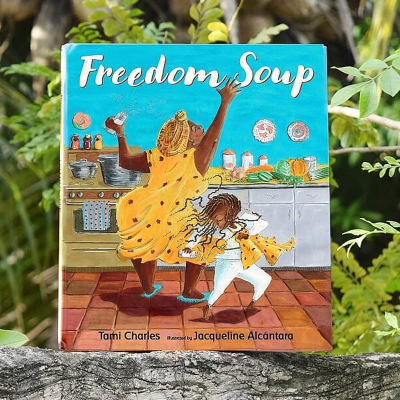Emancipating Caribbean Literature for Children
By Summer Edward
Summer Edward is the former Editor-in-Chief at Anansesem. Her writing and art have been published in various literary magazines and anthologies. Her home on the web is www.summeredward.com.


This article first appeared here in 2017 and has been republished with the author’s permission on August 1, 2023.
August 1st is Emancipation Day in my homeland of Trinidad and Tobago. The annual observance is celebrated on the anniversary of the passing of the Emancipation Bill that ended chattel slavery in what was then the British Empire. On August 1st, 1985, Trinidad and Tobago became the first country in the world to declare a national holiday to commemorate the abolition of slavery.
One hundred and eighty-five years have passed since the Emancipation Bill came into effect on August 1st, 1838. By comparison, 42 years have passed since the great Robert Nesta Marley, echoing the sentiments of the Jamaican Pan-Africanist orator, Marcus Garvey, penned the famous line of his “Redemption Song“:
Emancipate yourself from mental slavery,
none but ourselves can free our minds.
As I think about what Emancipation Day means to the people of the Caribbean, I cannot help but also think of what the observance means to me as a person and as a writer. As for any writer, the two things are intricately connected; I wouldn’t be myself if I couldn’t write.
And what kind of person-writer do I strive to be? I’m intent on being a writer who can write about my people, for my people. I seek to write from a secure identity, knowing that my voice is just as important, just as valid as other voices in the world. I want to be free to write with a clear head, with a clear conscience, knowing that I am not telling lies, or pandering to the white women who dominate publishing, but writing about what I know. I want to be free to judge my work by a standard of value and authenticity determined by myself and Caribbean people, by those who understand and are sympathetic to my reality, not by a foreign publishing world deaf and blind to my lived experiences and concerns.
I want to write knowing that as a Caribbean person, I am free to “talk my talk” on paper, in poetry, in song, in craft, in readings, in gatherings of writers. I want to be free from the voices that tell me I will never be a successful, widely-read children’s author because Caribbean children’s books simply don’t sell. I want to be free from that insidious conditioning that tells me that children’s books by foreign authors are automatically of a higher literary quality and should secure my consumption and respect, while children’s books written by Caribbean people gather dust on the bottom shelves of bookstores and history.
Free us from these big, bad myths.
When I reflect on why Caribbean children’s literature means so much to me, I think about the huge responsibility laid on the shoulders of the Caribbean children’s/YA writer/publisher. Ours is the burden of unsilencing voices, putting names to anonymity, reconditioning mindsets that are formed from the cradle. Ours is the burden of emancipating Caribbean literature for young people from literary models passed down to us from colonial headmasters and embracing instead models of our own making. We are tasked with using stories to help Caribbean children question dominant ideologies, love themselves and know their worth.
The more one thinks about the possibility of Caribbean children’s literature being something that can be “enslaved” the more it makes sense, since the literature of any people is a product of that people’s lived experiences in a particular social, economic, political, and historical context. From the de-legitimatizing of our nation languages to the necessity of relying on foreign publishing houses to publish our books, to the ingrained attitudes that keep Caribbean people from bringing certain conversations (like the region’s rampant adultism for example) to the forefront of Caribbean society, Caribbean children’s writers have historically faced barriers on every side, barriers that have made it that much harder for us to use our voices and experiment as freely as we would like to.
Yet we have persisted. We have pushed through. Somehow, we have carried on.
Today, as I celebrate Emancipation Day, my status as a dual Trinbagonian-American citizen reminds me that I am part of a generation of Caribbean writers who have found it easier to blossom outside of the region I call home. In many ways, going back and forth between Trinidad and the USA has afforded me a certain kind of freedom, has emancipated me from certain concerns. But I am also reminded of my responsibility to give back, to use whatever visibility and access I gain as someone with American ties to raise awareness of the difficulties that Caribbean young people and Caribbean children’s writers face. And also, to raise awareness of all that Caribbean people celebrate and are proud of. I am thankful for the lessons and points of view that come with being able to stand on the outside looking in.
And as I think about emancipating myself from my own (and my parents’) history of colonial schooling, my own history of not being able to find myself and my experiences reflected in the books I read as a child, Jamaican poet, Olive Senior’s indelible poem, Colonial Girl’s School comes to mind:
